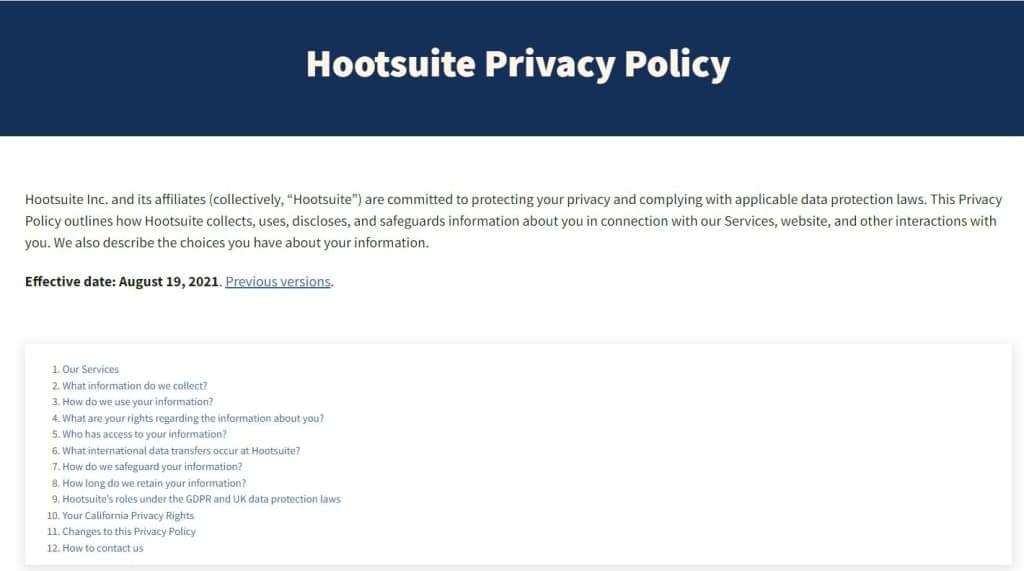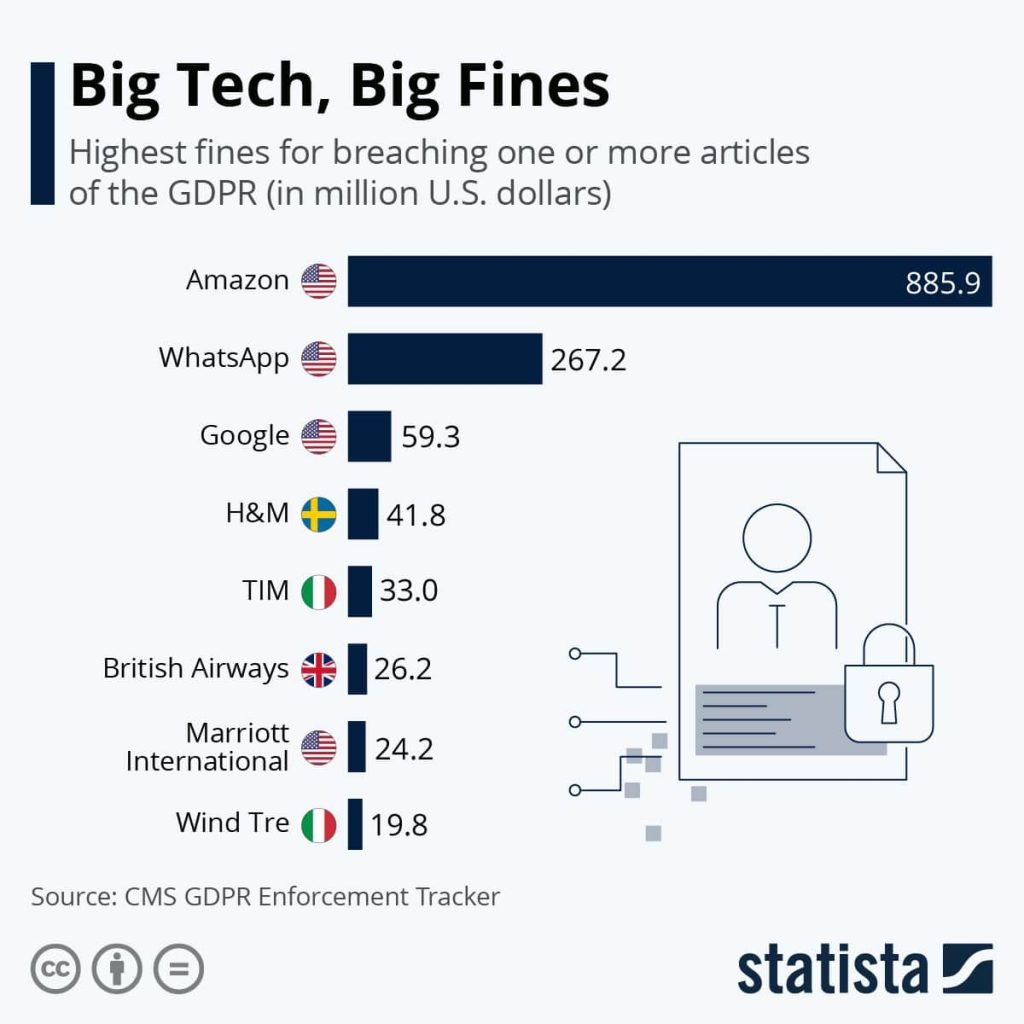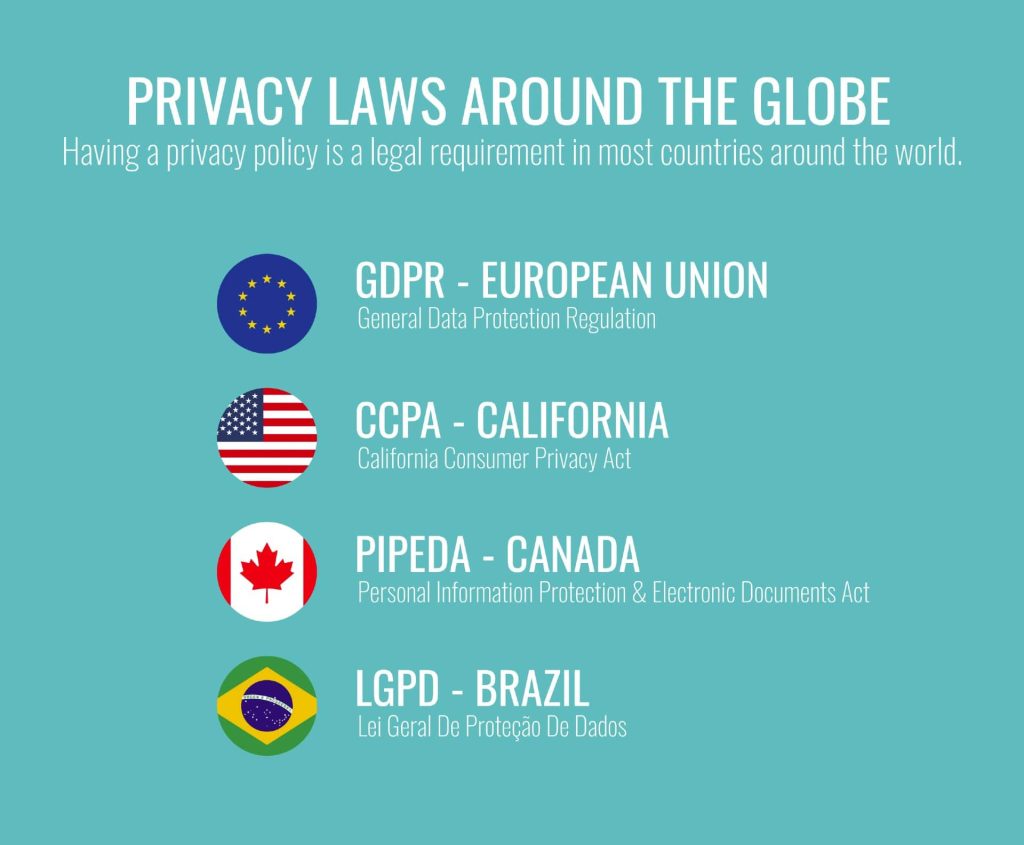Privacy is important. Not just for you and me, but for businesses as well. The internet has quite a long memory, and if your business doesn’t have a privacy policy, you could be in for some serious trouble down the line.
You may think you don’t need a privacy policy because your business is small, or you don’t believe you’re collecting any sensitive information. But that’s not the case. All businesses – big and small – need to have a privacy policy, and you’re actually collecting more information than you think.
Think about it: every time you visit a website, sign up for an online account or make a purchase online, you’re sharing some sort of personal information. This could be your name, address, email, credit card number, or even just your IP address. The same applies to your customers. And if you’re collecting and storing this information, you need to have a privacy policy in place.
With that said, let’s go back to the question at hand: why do you need a privacy policy? Here are 8 good reasons.
What Is a Privacy Policy?
Before we get into why you need a privacy policy, let’s first make sure we’re on the same page as to what it actually is. A privacy policy is a document that outlines how you collect, use, and store personal information. It’s also a way to build trust with your customers and show them that you take their privacy seriously.
While privacy policies can vary in length, they should all include the same basic information. Here’s what your privacy policy should cover:
- The types of personal information you collect
- Why you collect certain information
- How you use and disclose that information
- How you protect and store that information
- Your customers’ rights when it comes to their personal information
- Your contact information
If you’re not sure where to start, there are a number of privacy policy generators out there that can help you create a policy that’s tailored to your business.
Why You Need a Privacy Policy
Now that we’ve got that out of the way, let’s move on to the main event: why you need a privacy policy.
1. It’s the Law
In some places, having a privacy policy is actually the law. It’s important to note that these laws are always changing and evolving, so staying up-to-date is important. Not just that, but the laws you follow are those of the country or region your consumers are based in. Accordingly, the more you expand your reach, the more laws you need to be aware of.
Here are a few examples of laws that require you to have a privacy policy:
US Federal Law
The Children’s Online Privacy Protection Rule (COPPA) requires American websites and online services directed at children under 13 or that gather consent from a child’s parent or guardian before collecting, using, or disclosing personal information from kids.
Another law, the Health Insurance Portability and Accountability Act (HIPAA), enforces specific requirements for how companies in the healthcare industry can collect, use, and store sensitive patient data.
California
California is known to have some of the strictest data privacy laws in the US. The California Consumer Protection Act (CCPA) requires all commercial websites and online services that collect personal information from California residents to have a conspicuous privacy policy posted on their sites.
It also details specific rules pertaining to cookies, requiring every website or online service that uses cookies to disclose this fact in their privacy policy or have a separate cookies policy and outlined opt-out process.
Europe
If you’re doing business in the European Union, you need to be compliant with the General Data Protection Regulation (GDPR). This law follows a “Privacy By Design” process, which entails businesses examining their data collection and storage processes and making sure they’re designed with privacy in mind from the start. That way, you’re less likely to run into privacy issues down the road.
The GDPR also requires businesses to make it clear to customers what personal information is being collected and why. On top of that, businesses must take down any personal data upon a customer’s request and let them know if their data has been breached.
2. It Builds Trust With Your Customers
In today’s day and age, data privacy is a very real concern for consumers. However, according to Salesforce, 88% of people trust companies that vow not to share their personal information without permission.
A privacy policy is a way to show your customers that you’re taking their privacy seriously and that you’re not going to do anything with their personal information without their consent. This, in turn, builds trust between you and your customers, which is essential for any business-consumer relationship.
Pro Tip: Don’t make your privacy policy too long or difficult to understand. The easier it is for customers to find the information they’re looking for, the more likely they are to trust your business. Design it in a way that’s easy to navigate and put the most important information upfront.
3. It Can Make Your Customers Feel Comfortable Doing Business With You
In the same vein as building trust, a privacy policy can also make your customers feel more comfortable doing business with you. After all, if they know their personal information is in good hands, they’re more likely to hand it over to you in the first place.
How many times have we all read about a major data breach in the news and cringed at the thought of our personal information being leaked? We’ve all been there. And you don’t want your customers to feel that way when they’re doing business with you.
By having a privacy policy, you can instill a sense of comfort in your customers and let them know that you’re taking the necessary precautions to protect their information, no matter what.
4. Some Third-Party Platforms Require It
If you’re using any third-party platforms to do business, there’s a chance they might require you to have a privacy policy in place. For example, if you’re using Google Analytics to track your website traffic, Google requires you to have a privacy policy. The same applies to all other Google products, as well as Apple ones, among others.

That’s especially because these companies collect customer data as well. Therefore, you must guarantee a full chain of custody for this data, from the vendor all the way to the customer, and a privacy policy is the best way to do that. That way, you’re guaranteeing that the data collected by these platforms will be handled in a compliant way with the law.
5. It Can Help You Avoid Fines and Penalties
In some cases, not having a privacy policy is actually against the law. But even if it’s not required by law in your jurisdiction, failing to have one could still come with some pretty severe consequences, among which are hefty fines.

Take the example of the Irish court fining WhatsApp $267 million for its privacy policy being vague and misleading. The company was fined because the policy failed to mention that WhatsApp shares some user data with Facebook (now Meta). As a result, many users thought their information would be completely private when, in fact, it wasn’t.
Below are some more examples of fines related to privacy policy violations:
- The GDPR provides a maximum penalty of €10 million or 2% of worldwide annual revenue from the prior financial year – whichever is greater.
- The maximum fines for CCPA violations are up to $7,500 per intentional offense and up to $2,500 per unintentional offense.
- HIPAA classifies violations into five levels. Tier 1 penalties may be as little as $100 per violation up to $50,000, while the most serious violations, Tier 4, incur a minimum penalty of $50,000 per occurrence and no maximum cap.
- Each violation of the Children’s Online Privacy Protection Act (COPPA) can result in a $43,792 penalty.
This goes to show that not having a privacy policy — or not following the one you have in place — can come with some pretty severe consequences. So why not avoid all that trouble and just make sure you have a good policy from the get-go?
6. Search Engines Will Take You More Seriously
If you want your website to rank higher in search engine results pages (SERPs), you need to take privacy seriously. That’s because, in order for a website to rank higher, it needs to prove that it’s trustworthy — and what better way to do that than by having a privacy policy?
Search engines prioritize websites that take data privacy and security seriously. Therefore, if you have a privacy policy in place, it’s more likely that your website will rank higher in SERPs than one that doesn’t.
The same actually goes for marketing – most ad sellers require you to have a privacy policy before you can run ads on your site. So, if you want to run ads but don’t have a privacy policy in place, this should give you all the more reason to get one. They, too, prioritize privacy-conscious websites.
7. It Enables You to Stay In the Loop With Technology
The world of data privacy is constantly changing, which means that you need to stay up-to-date with the latest regulations if you want to avoid any penalties.
Having a privacy policy in place gives you a good starting point for that, as it’ll already contain some important information. From there, you can make the necessary changes to ensure compliance with the latest regulations.
For instance, many businesses are now relying on cloud storage to store customer data to cut costs. However, before you make the switch, you need to update your privacy policy to reflect this change and inform customers that their data will now be stored off-site.
This is quite a recent example and goes to show that things can change quickly in the world of data privacy. Having a privacy policy lets you stay on top of these changes and ensure that your business remains compliant.
8. It’s the Ethical Thing to Do
Last but not least, it’s important to remember that a privacy policy is the ethical thing to do. Customers trust you with their personal information, and it’s your responsibility to protect that information.
Imagine if your personal information was mishandled — you’d be pretty upset, right? Well, your customers feel exactly the same way.
Today, everything is online, and that means the amount of data out there will only continue to grow. As a result, it’s more important than ever to have a privacy policy in place to protect the information of both your customers and your business.
They have a right to know how their information is being used, and you have a responsibility to tell them. There are no two ways about it.
A privacy policy gives customers peace of mind that their information is being protected, which can encourage them to do business with you. It also shows that you’re a responsible company that takes data privacy and security seriously, which can ultimately help you grow your business.
The Bottom Line: Be Transparent
Just like you have the chance to leverage data to improve your business, your customers should equally have the chance to know how their data is being used. After all, it’s their data. They’re only asking for one thing: transparency.
The solution is simple: develop a privacy policy. It’s the basis for any good data protection strategy, and, as we’ve seen, it comes with a whole host of benefits, from increasing conversions to protecting you from hefty fines.
Ready to get started? We can help you create a privacy policy that’s compliant with the latest regulations. Get in touch to find out more.



